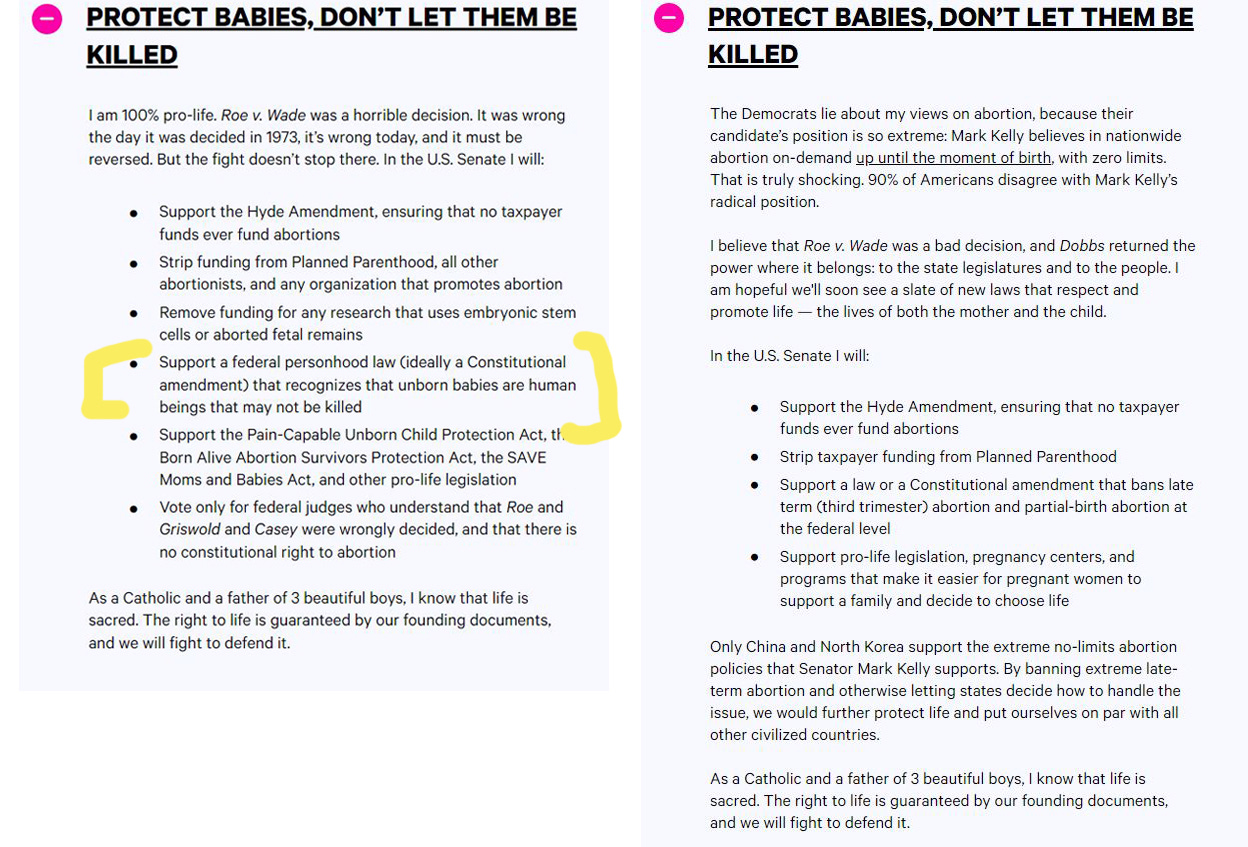Republicans’ Three Paths on Abortion
What the post-Dobbs facts and politics are starting to look like for the GOP.
A lot has happened in the two months since the dog finally caught the car—that is, since the Supreme Court handed down the Dobbs decision undoing Roe v. Wade’s court-mandated right to abortion. In some states, pre-Roe laws restricting abortions have come back into effect. In more than a dozen states, there were more recent laws on the books, passed by Republican legislatures, that would trigger some sort of total or near total-ban on abortion once the Court overturned Roe. Other proposals to limit (or in some cases, codify) abortion access have been trudging through several state legislatures, and some state courts have stepped in to block laws from being implemented.
Alongside the legal developments, there has been a constant flow of stories about women and girls unable to get an abortion in situations in which most people—often including even pro-lifers—would agree that an abortion would be medically or ethically appropriate.
Republican politicians in or seeking elected office, especially those in the midterms just ten weeks away, have watched how abortion has rapidly become a much more important issue to registered voters. There are now essentially three paths available to them—three choices, based on their personalities and principles, and their assessment of where their voters stand.
1. The Blake Masters Path: De-emphasize abortion.
While he was running for the GOP nomination to challenge Sen. Mark Kelly in Arizona, Blake Masters had on his website a pledge to support a federal personhood law or constitutional amendment. That pledge has been deleted (here is a screenshot from May on the left and one from today on the right):

And the press noticed:

Masters isn’t alone among GOP contenders in quieting down his abortion stance after winning the nomination. Even Doug Mastriano has stayed mum since winning his primary. When Michigan state senator Tom Barrett, a candidate for Congress, was asked why the language about abortion on his website was altered, he said this:
I don't watch my own website every day, so I don't know. . . . But I am sure we probably were updating things based upon the issues that were most salient right now, which are inflation, cost of living, crime, border security. Those are really the four pillars that are the leading issues that voters are most concerned with.
It’s a pretty big tell, if you ask me, turning abortion into one of those wink-and-nod issues with pro-lifers, who heretofore demanded honesty about abortion from Republicans. The pro-life community was very distrustful of flip-floppers when Mitt Romney ran for president, but that went out the window with Donald Trump, whose conversion of convenience gave them the judges needed to overturn Roe, so they were fine with setting principles aside to get the big prize. And boy did that pay off—so don’t expect any pro-lifers to pressure Masters and the others now about inconsistency.
2. The Tudor Dixon Path: Full steam ahead, no exceptions.
Another possibility is to keep strongly supporting limitations on abortion, often without any exceptions for cases of rape and incest, or the health of the mother. It’s easier for people who aren’t running in statewide elections but rather for safe, red seats to hold this more extreme position. Still, some people running for statewide office, like Michigan gubernatorial candidate Tudor Dixon, just keep on truckin’ through the gaffes. When asked about a theoretical child rape victim, Dixon said this:
I’ve talked to those people who were the child of a rape victim and the bond that those two people made. . . . And the fact that out of that tragedy, there was healing through that baby. It’s something that we don’t think about because we assume that that story is someone who was taken from the front yard then returned. That’s generally not the story there. And those voices, the babies of rape victims that have come forward, are very powerful when you hear their story and what the truth is behind that. It’s very hard to not stand up for those people.
“Healing through that baby”? Dixon’s comments are reminiscent of the late Missouri Rep. Todd Akin, who lost his Senate bid in Missouri a decade ago after his bizarre comments about rape—he claimed that victims of “legitimate rape” don’t usually get pregnant because “the female body has ways to try to shut that whole thing down”—were deemed callous and out of touch by Missouri voters. Of course, many women who become pregnant through rape decide to carry their child to term, usually resulting in adoption. Maybe there are cases where women find solace in the pregnancy and birth, but that seems like it would be so unusual a circumstance as to be irrelevant to public policy making. But Dixon believes that it is sufficient justification for her extreme position.
In Missouri, Mary Coleman, a state representative, proposed a law that would make it a crime to travel across state lines to seek an abortion. (Disclosure: I went to college with Coleman and am friends with her.) Neighboring Illinois has legal abortion, and Kansans just rejected a ballot initiative to enable laws restricting abortion. While Justice Kavanaugh wrote in his concurring opinion in Dobbs this would be an unconstitutional violation of the right to interstate travel, conservatives are sure to keep trying until a court tells them no.
3. The “I get it, now” path.
Some Republicans are belatedly realizing the unintended consequences of abortion restrictions in some states. This doesn’t mean they’ll be switching sides and winning endorsements from Planned Parenthood or EMILY’s List, but it does suggest that at least some Republicans are feeling the pressure to adjust to the new political realities.
In a now-viral video, Neal Collins, a Republican state representative in South Carolina, expressed regret for supporting the fetal heartbeat law enacted by the state last year. Collins said that one of his constituents, a doctor, told him about how it is impacting women. Until that call, Rep. Collins apparently never considered the effect of his vote—probably because, before Dobbs, these sorts of exercises were less about legislating and more often about trying to keep the base happy or get a case before the high court.
Other disturbing post-Dobbs stories are popping up all over. In Louisiana, a woman named Nancy Davis is pregnant with a child that unfortunately has a rare condition that prevents a skull from becoming fully formed. The child cannot survive outside of the womb. The state’s trigger laws caused abortion clinics to close, and hospitals, wary of the wording of the law, have refused to provide Davis with an abortion. She delivered a devastating line: “Basically, they said I had to carry my baby to bury my baby.”
Pro-life legislators in Louisiana contend that the law does provide for an exception, and that Davis can have an abortion. But what happens if no hospital will do it?
This is the complicated reality that a party and a movement that has used maximalist rhetoric on the issue of abortion for decades now must face.
Indeed, even if you are a pro-life legislator who opposes abortion, but with restrictions for rape, incest, and life of the mother, these cases are going to keep happening. And absent very clear laws, nice amicus letters from pro-life legislators is not going to compel a hospital to take what it deems to be a legal risk. More and better legislating is required.
So Republicans are stuck: The pro-life base won’t want to revisit badly written laws restricting abortion, even to make those laws more clear, because revisiting them will be seen as softening them. But meanwhile, Republicans will feel the heat from voters who read about stories like Nancy Davis’s and think of the GOP. If Republicans don’t move quickly to fix these laws, voters—especially women voters—in many states will associate the party with horror and cruelty for years to come.





